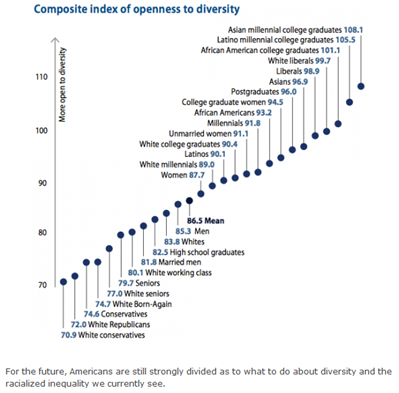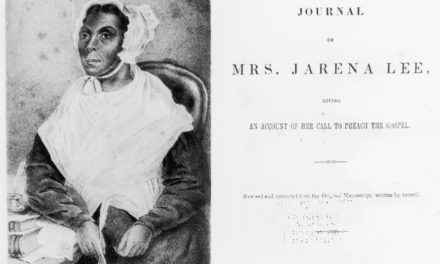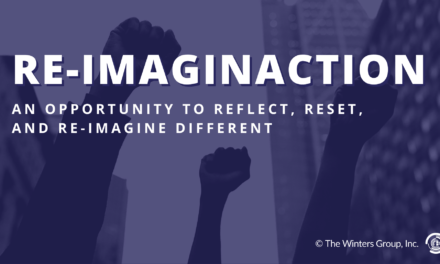
The Center for American Progress (CAP) and PolicyLink released a book earlier this called All-In Nation: An America that Works for All—analyzing changing demographics and exploring policies that would ensure that a more diverse workforce is prepared for the jobs of the future and that all people are in a position to contribute to and benefit from economic growth. As a complement to the book, CAP and PolicyLink partnered with the Rockefeller Foundation and Latino Decisions to survey how Americans view issues of rising diversity.
- The study found that most Americans overestimate the current diversity in the United States. The median survey score was 49 percent; the actual is 37 percent.
- Respondents were more positive than negative about the opportunities that increased diversity offers, with an indexed score of 51 to 44, respectively.
- However the study did show wide divergence in opinion among different demographic groups on their openness to diversity as shown below.

- A majority of respondents also agree that more diversity will lead to greater innovation. The statement “Diverse workplaces and schools will help make American businesses more innovative and competitive,” received 69 percent agreement, 15 percent disagreeing, and a mean score of 6.8.
- On the downside, fifty four percent of the respondents worry that more minorities means fewer jobs, almost half think that it means more crime, and 62 percent think these groups strain social services. In addition 42 percent registered agreement with the statement, “Discrimination against whites will increase”.
- While 71 percent of respondents support “new steps to reduce racial and ethnic inequality in America through investments in areas like education, job training, and infrastructure improvement,” there are differences of opinion among demographic groups of how to accomplish it. Americans are essentially split on whether it will take collective or individual action, with 49 percent of the public agreeing that our economic challenges are common and 47 percent believing that Americans are on their own and cannot count on others to help them. Racial splits are significant, with most African Americans, Latinos, and Asians agreeing that we should “work together” on common economic challenges—69 percent, 54 percent, and 52 percent, respectively. By contrast, a majority of whites—52 percent—believe that Americans are “on their own” and cannot count on others.
What do I conclude from this study? The findings aren’t too surprising and I am encouraged that 69 perccent of respondents think that diversity drives innovation! The issue of individualism vs collectivism is not new. I, probably not surprisingly, am an advocate for collective action. The inclusion solution is to keep working on getting those who indexed much lower on openness to diversity to understand how diversity and inclusion helps us all and those who believe it is an “individual” issue to see our interdependence.


















